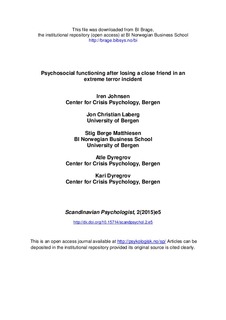| dc.contributor.author | Johnsen, Iren | |
| dc.contributor.author | Laberg, Jon Christian | |
| dc.contributor.author | Matthiesen, Stig Berge | |
| dc.contributor.author | Dyregrov, Atle | |
| dc.contributor.author | Dyregrov, Kari | |
| dc.date.accessioned | 2015-04-13T11:44:43Z | |
| dc.date.available | 2015-04-13T11:44:43Z | |
| dc.date.issued | 2015 | |
| dc.identifier.citation | Scandinavian Psychologist, 2(2015)e5 | nb_NO |
| dc.identifier.issn | 1894-5570 | |
| dc.identifier.uri | http://hdl.handle.net/11250/281516 | |
| dc.description | This is the originally published version of the article. The journal is Open Access, available at http://psykologisk.no/ | nb_NO |
| dc.description.abstract | Do candidate risk factors for complicated grief, and associations with other problems after traumatic deaths (e.g., homicide, suicide, disaster, or accident), also apply to bereaved friends? In this article we present results from a study on 76 bereaved friends’ situation after the killings at Utøya 22nd July 2011, and focus on grief and trauma reactions, psychological distress and psychosocial functioning. We observed that the bereaved friends, especially females, had high levels of both grief and trauma reactions that affected functioning and ability to study/work. These findings call for a broader perspective on who is affected when someone dies, and a recognition of grief after the loss of a friend. | nb_NO |
| dc.language.iso | eng | nb_NO |
| dc.publisher | Psykologisk.no | nb_NO |
| dc.title | Psychosocial functioning after losing a close friend in an | nb_NO |
| dc.type | Journal article | nb_NO |
| dc.type | Peer reviewed | nb_NO |
| dc.source.journal | Scandinavian Psychologist | nb_NO |
| dc.identifier.doi | http://dx.doi.org/10.15714/scandpsychol.2.e5 | |
| dc.description.localcode | OA, 1 | nb_NO |
